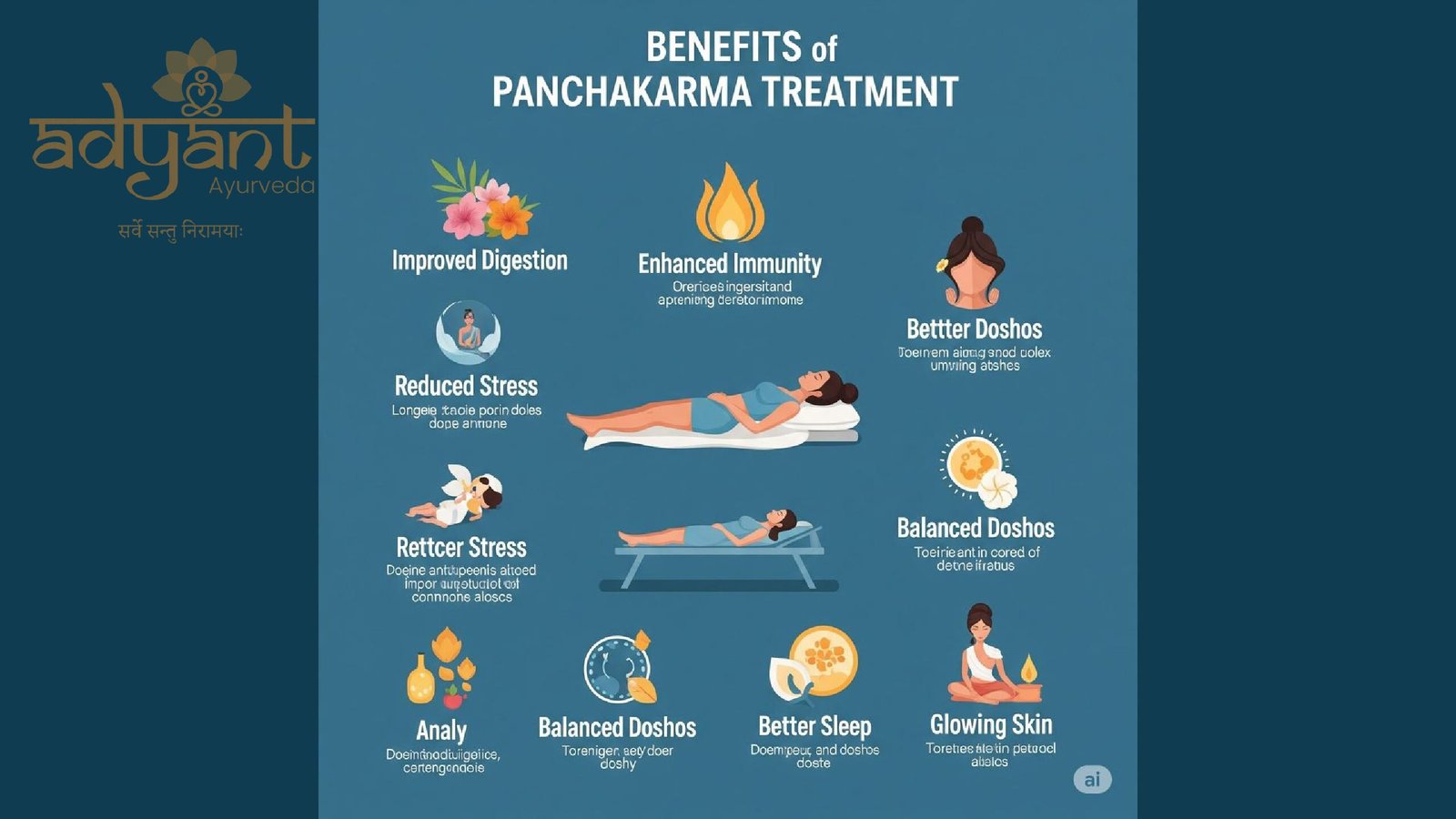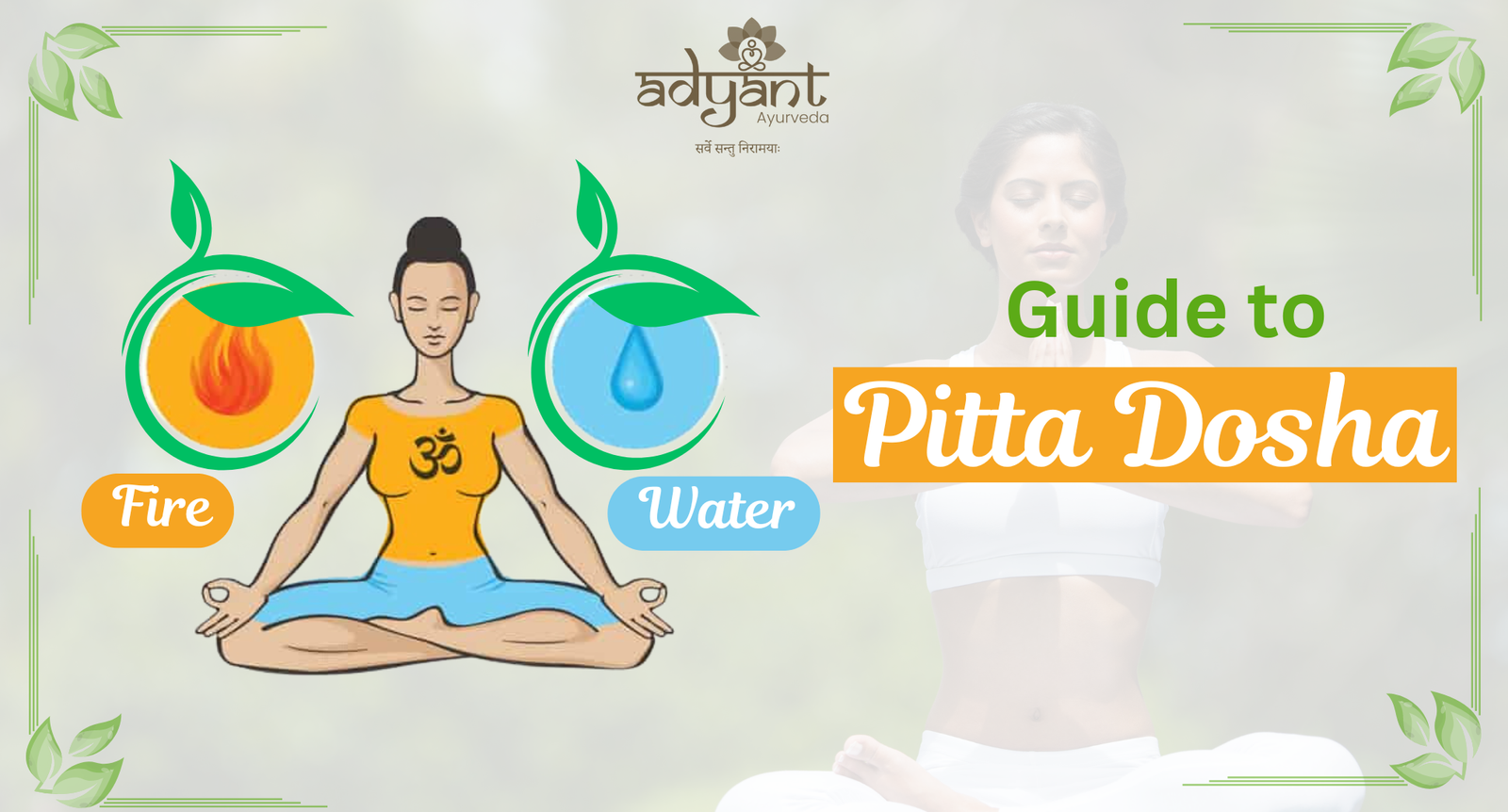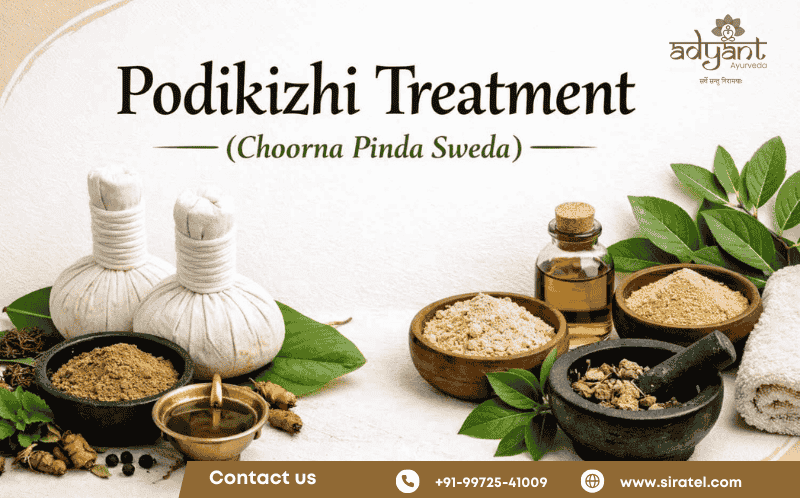Table of Contents
Toggle🌿 Introduction
Benefits of Panchakarma: In today’s fast-paced world, where stress, poor diet, and pollution are daily challenges, more people are turning to natural and holistic solutions for health and well-being. One such time-tested Ayurvedic therapy is Panchakarma, a profound detox and rejuvenation program that cleanses the body and rebalances the mind.
📚 Classical References: The Roots of Panchakarma
Panchakarma is not a modern wellness trend — it’s a time-honored therapeutic system described in classical Ayurvedic texts like the Charaka Samhita and Ashtanga Hridaya. These scriptures detail Panchakarma as the ultimate purification therapy, designed to remove deep-rooted toxins (Ama) and restore doshic balance. Its foundation in ancient wisdom gives Panchakarma its credibility and depth.
❓ What is Panchakarma?
The word Panchakarma comes from Sanskrit: Pancha means “five” and Karma means “actions.” These five actions are a set of therapeutic procedures designed to detoxify and rejuvenate the body:
Vamana (Emesis): Controlled therapeutic vomiting to eliminate excess Kapha.
Virechana (Purgation): Cleansing of Pitta-related toxins through purgatives.
Basti (Medicated Enema): Herbal decoctions and oils to cleanse Vata toxins from the colon.
Nasya (Nasal Therapy): Detox through the nasal passages to cleanse the head region.
Raktamokshana (Bloodletting): Controlled removal of impure blood (rarely used today).
These therapies are customized based on one’s Prakriti (body constitution) and Vikriti (current imbalances) to ensure holistic healing.
🌿 Panchakarma at Adyant Ayurveda, Bangalore
At Adyant Ayurveda, we specialize in authentic Panchakarma treatments across our four centers in Jayanagar, Indiranagar, Kalyan Nagar, and Rajarajeshwari Nagar. With over 24 years of expertise and a team of experienced Ayurvedic doctors, our personalized therapies are rooted in classical texts and adapted to modern needs.
⚙️ How Panchakarma Works: The Science Behind the Therapy
Awagaha Swedan: Herbal immersion induces sweating, improves blood flow, and facilitates metabolic waste removal.
Gokshuradi Siddha Sneha Basti: Delivers medicated oils through rectal route, balances Vata, and improves nervous/hormonal function.
Shirodhara: Dripping warm oil on the forehead reduces cortisol and serotonin, promoting relaxation.
Abhyangam: Oil massage stimulates lymphatic drainage and supports hormonal balance.
🔬 How Panchakarma Aligns with Modern Wellness
Modern science is beginning to validate what Ayurveda has practiced for centuries:
Reduces oxidative stress and inflammation
Enhances gut health and microbiome balance
Detoxifies heavy metals and environmental pollutants
Supports emotional and mental health
Improves sleep, mood, and mental clarity
📋 Symptoms Indicating the Need for Panchakarma
You may need Panchakarma when your body starts accumulating Ama due to poor diet, irregular routines, or stress. Common signs include:
Persistent fatigue
Brain fog
Bad breath and a coated tongue
Irregular digestion
Cravings and weight fluctuations
Disrupted sleep
Ayurvedic scriptures recommend undergoing Panchakarma once a year for optimal well-being.
🔄 The Three Phases of Panchakarma Treatment
1. Purva Karma (Preparatory Phase)
Prepares the body through:
Snehan – Internal and external oleation
Swedana – Herbal steam/fomentation
2. Pradhana Karma (Main Detox Procedures)
Based on doshic imbalances:
Vamana for Kapha
Virechana for Pitta
Basti for Vata
Nasya and Raktamokshana as supportive therapies
3. Paschat Karma (Post-Treatment Rejuvenation)
Gradual diet (Samsarjana Krama)
Rasayana therapy with Ashwagandha, Amalaki, Shatavari, etc.
Rest and lifestyle guidance
🎯 Benefits of Panchakarma Treatment
🌿 Physical Benefits
Detoxification of tissues and organs
Enhanced digestion (Agni)
Hormonal balance (PCOS, thyroid, menopause)
Relief from arthritis, asthma, constipation, etc.
🧠 Mental and Emotional Benefits
Stress and anxiety reduction
Improved sleep and clarity
Emotional balance and focus
🛡️ Immune & Preventive Benefits
Boosts immunity (Ojas)
Seasonal cleansing for dosha balance
Slows aging and boosts energy
✅ Five Major Benefits at a Glance
Detoxifies body and mind
Balances doshas
Improves sleep and diet habits
Reduces stress
Aids sustainable weight loss
Long-term benefits: Delayed aging, stronger immunity, better digestion, enhanced mental sharpness.
🧪 Panchakarma Benefits in Managing Diseases
| Condition | Ayurvedic Insight | Key Panchakarma Therapies | Benefits Observed |
|---|---|---|---|
| Type 2 Diabetes & Hypertension | Agni dushti (digestive impairment), ama accumulation, Vata-Pitta imbalance | – Virechana (detox liver & pancreas) – Basti (balance Vata) – Udwartana (reduce fat, improve metabolism) – Shirodhara (reduce stress, support HPA axis) | ✔ Lower blood sugar (HbA1c) ✔ Improved BP control ✔ Reduced fatigue & weight ✔ Better insulin sensitivity |
| Chronic Kidney Disease (CKD) | Mutravaha srotas dushti (urinary channel disorder), Vata-Kapha aggravation | – Lekhana Basti (reduce ama & toxins) – Matra Basti (renal tonics like Gokshura) – Rasayana therapy (Punarnava, Varuna) | ✔ Improved GFR & urine output ✔ Lower creatinine levels ✔ Reduced swelling ✔ Enhanced kidney function |
| Skin Disorders (Eczema, Psoriasis) | Pitta & Rakta dosha aggravation, ama in blood, liver congestion | – Virechana (blood purification) – Raktamokshana (remove toxins) – Takradhara/Kashayadhara (cooling therapy) – Abhyanga with herbal oils | ✔ Relief from itching & burning ✔ Reduced recurrence ✔ Clearer skin ✔ Boosted immunity |
| IBS, Constipation & Digestive Issues | Vata imbalance, weak Agni, mental stress | – Virechana (cleanse intestines) – Basti (regulate Vata) – Nasya (brain-gut axis support) – Digestive Rasayana (buttermilk, jeera) | ✔ Regular bowel movements ✔ Reduced gas & bloating ✔ Stronger digestion ✔ Mental calmness |
| PCOS & Infertility | Kapha accumulation, ama, hormonal imbalance, blocked reproductive channels | – Vamana/Virechana (detox Kapha & Pitta) – Udwartana (weight reduction) – Basti with Phala Ghrita – Nasya, Shirodhara | ✔ Improved ovulation ✔ Balanced cycles ✔ Weight loss ✔ Natural conception support |
| Stress, Anxiety & Insomnia | Vata-Pitta imbalance, high cortisol, disturbed Sattva guna | – Shirodhara (calms nervous system) – Nasya (clears mind channels) – Abhyanga, Padabhyanga – Takradhara/Ksheeradhara | ✔ Deep sleep ✔ Mental clarity ✔ Reduced anxiety ✔ Emotional stability |
✅ Note: Each Panchakarma treatment is personalized at Adyant Ayurveda, based on detailed Nadi Pariksha and dosha analysis to ensure the best possible outcomes.
📊 Real Results: Panchakarma Case Studies
CKD Patient: GFR improved from 7.5 to 17 ml/min; reduced urea and creatinine in 10 days.
Diabetic Patient: Normalized sugar levels, better heart function (GLS), and lipid profile.
⚖️ Panchakarma vs. Conventional Treatments
| Panchakarma | Conventional Medicine |
|---|---|
| Holistic body-mind detox | Symptom suppression |
| No side effects | Potential adverse reactions |
| Personalized treatment | Standardized dosing |
| Root cause management | Often disease control |
| Cost-effective for chronic care | Expensive in long-term management |
🥗 Lifestyle & Diet During Panchakarma
DIP Diet: Millet-based, no salt/processed food
Hydration: Alkaline/herbal water
Meals: Fruits, fermented shakes, herbal teas, raw salads
Routine: Yoga, meditation, early sleep
Post-meal: Vajrasana, gratitude practice
Fasting: Once a week under supervision
⚠️ Contraindications: When to Avoid Panchakarma
Avoid or modify Panchakarma in these cases:
Children < 7 years
Frail or elderly patients
Pregnancy or menstruation
Acute illness or infection
Post-surgery recovery
Uncontrolled chronic diseases (without supervision)
🧬 Scientific Validation & Studies
Studies show:
Improved GFR, reduced urea/creatinine
Better blood pressure, sugar control
Pain relief and increased energy
Panchakarma is gaining global recognition as a scientifically validated therapy.
👥 Who Should Consider Panchakarma?
Healthy individuals for preventive care
People with chronic diseases
Recovery phase post-illness
Mental and emotional exhaustion
✅ Safety, Precautions & Expert Guidance
Important: Panchakarma is not DIY. It must be performed under expert Ayurvedic supervision.
Avoid if:
Pregnant
Acutely ill or feverish
Malnourished or extremely weak
✨ What to Expect After Panchakarma
Lightness and mental clarity
Stronger digestion
Balanced emotions
Improved sleep
Radiant skin and eyes
More energy and mindfulness
Weight stabilization
Follow-up Tip: Maintain results with diet, daily oil massage, yoga, and follow-up with your doctor.
💰 Estimated Panchakarma Cost at Adyant Ayurveda
| Treatment | Duration | Cost (INR) |
|---|---|---|
| Vamana | 12–14 days | ₹11,000 – ₹14,000 |
| Virechana | 12–18 days | ₹11,000 – ₹14,000 |
| Nasya | Per session | ₹899 – ₹999 |
| Basti | 8 days | ₹10,000 – ₹12,000 |
| Raktamokshana | Per session | ₹500 – ₹1,000 |
🧘♀️ Conclusion
Panchakarma is more than just a detox—it’s a complete mind-body reboot grounded in ancient Ayurvedic wisdom and supported by modern science. Whether you’re seeking relief from chronic ailments or simply striving for optimal health, Panchakarma offers a safe, holistic, and transformative path to wellness.
Ready to begin your Panchakarma journey?
Call us at 📞 9972541009 or book a Consultation at your nearest Adyant Ayurveda center.
Refereances
Read Case Studies of Our Patients Related to Panchakarma Treatment and Its Benefits
A Comprehensive Management of Hyperlipidemia with a Case Study From Adyant Ayurveda
A Classic Case Study of Effectiveness of Panchakarma Virechana in Psoriasis
Effect of Virechana on Hypothyroidism– A Case Study From Adyant Ayurveda
✅ FAQs on Panchakarma Treatment at Adyant Ayurveda
What is Panchakarma treatment in Ayurveda?
Panchakarma is a classical Ayurvedic detoxification therapy involving five core procedures – Vamana, Virechana, Basti, Nasya, and Raktamokshana—to cleanse the body, balance doshas, and restore health.
How is Panchakarma different from regular Ayurvedic treatments?
Unlike general Ayurvedic treatments, Panchakarma aims to remove deep-rooted toxins (Ama) from the body through bio-purification techniques, offering long-term disease reversal and rejuvenation.
Who should undergo Panchakarma treatment?
Panchakarma is recommended for individuals with chronic diseases, stress, lifestyle disorders (like diabetes, obesity, PCOD), infertility, skin problems, and those seeking preventive wellness or seasonal detox.
Is Panchakarma safe for everyone?
Yes, when conducted by qualified Ayurvedic doctors, Panchakarma is safe and highly personalized based on age, dosha imbalance, health status, and digestive strength.
How long does a full Panchakarma treatment take?
A complete Panchakarma program typically takes 21 to 28 days, including Purva Karma (preparation), Pradhana Karma (main procedures), and Paschat Karma (post-care). However, shorter detox plans can also be customized.
What is the cost of Panchakarma treatment in Bangalore?
At Adyant Ayurveda, Panchakarma treatments start from ₹14,000 for basic detox and go up to ₹45,000 for complete disease-specific programs, depending on procedures and duration.
Which Panchakarma procedure is best for weight loss?
Virechana (therapeutic purgation), Udwarthanam (herbal powder massage), and Lekhana Basti are ideal Panchakarma therapies for reducing body fat and improving metabolism.
Can Panchakarma cure diabetes and other chronic diseases?
Panchakarma doesn’t “cure” diseases in the conventional sense but helps reverse metabolic disorders like diabetes, fatty liver, thyroid issues, and PCOD by removing toxins and improving organ function.
What preparations are needed before starting Panchakarma?
Before the main therapies, you’ll undergo preparatory steps like Snehapana (internal oleation) and Swedana (herbal steam) to loosen toxins and prepare your body for detox.
What diet should I follow during Panchakarma?
A light, dosha-balancing Ayurvedic diet including kitchari, herbal teas, and seasonal fruits is recommended. Spices, oily foods, dairy, and non-veg should be avoided during treatment.
Is Panchakarma effective for mental health issues like stress and anxiety?
Yes, therapies like Shirodhara, Nasya, and Abhyanga calm the nervous system, reduce cortisol levels, and help manage anxiety, depression, and insomnia naturally.
Are Panchakarma treatments painful or uncomfortable?
No, Panchakarma treatments are gentle and non-invasive. Some processes, like purgation or emesis, may cause mild temporary discomfort, but they are carefully monitored by doctors.
How often should Panchakarma be done?
For preventive care, once a year (especially before seasonal transitions) is ideal. For chronic conditions, it may be repeated every 6 months or as advised by your Ayurvedic physician.
Can I continue my regular work during Panchakarma?
It’s recommended to take a break or minimize physical/mental stress during Panchakarma for optimal results. However, milder therapies can sometimes be done alongside routine work.
Where can I get the best Panchakarma treatment in Bangalore?
Adyant Ayurveda offers authentic, customized Panchakarma therapies across four branches in Jayanagar, Indiranagar, Kalyan Nagar, and Rajarajeshwari Nagar, under expert supervision.









